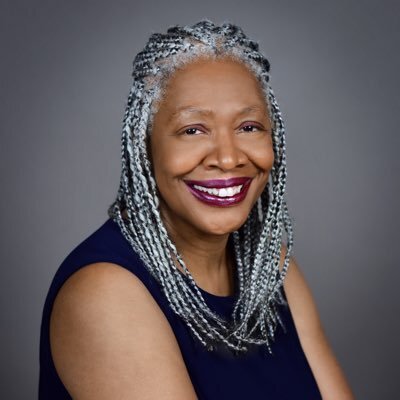ARTICLES
Volume 38 No. 5 Fall II - 2020
This article originally appeared in the print version of Women Against Military Madness Newsletter Vol 38, No 5, 2020.

As we fast approach the 2020 presidential elections, Women Against Military Madness presents a Q&A with Margaret Kimberley on her new book (Steerforth Press, 2020) examining U.S. presidents from a Black perspective—a focus that should be of interest to all. Kimberley is the co-founder, senior editor and columnist of Black Agenda Report, a member of the coordinating committee of Black Alliance for Peace, and serves on the Administrative Committee of United National Antiwar Coalition.
A: Prejudential: Black America and the Presidents presents 45 essays, one for each presidency, that analyze the history of Black people as they attempt to navigate a political system which is inherently hostile to their existence. Chattel slavery was defeated after 200 years of European settlement only to be followed by nearly 100 years of Jim Crow segregation, and now 50 years of varying degrees of reaction. The presidency is a long history of betrayals punctuated by progress only when brought about by the action of the people themselves.
This book is the result of a Black Agenda Report column (I’m a co-founder and editor and senior columnist at that site) that I wrote in 2014 about Theodore Roosevelt. I watched a PBS documentary about the Roosevelt family that was not surprisingly a paean to its subjects. But I was struck by the fact that as usual Roosevelt’s very open bigotry was omitted and I felt moved to write about his white supremacist beliefs, the war against the Philippines, and his unjust court-martial of black soldiers in Brownsville, Texas. A friend and supporter of Black Agenda Report urged me to write about all of the presidents and I began this journey.

Q: Who do you see as the audience for the book?
A: Prejudential obviously appeals to anyone interested in American history in general, and Black studies and presidential history in particular.
Q: Much has been written about presidents beginning with Washington up through Trump today. Given the vast amount of information about presidents, how did you approach the subject?
A: The information I researched is readily available to anyone who looks for it, although that is easier said than done. The subject matter is a contentious one and scholars have hidden much of the information I present.
Most people want to feel positive about their country and its leadership. That is a problem, because most historians feel that way too. My area of interest meant that I had to take special care to decipher what others had written before me. Most historians are system affirming people and don’t want to give great attention to anything which casts a blemish on notions of American superiority.
Biographies of the twelve slave-holding presidents will say that the human beings they enslaved as property were well treated and say little else about their lives or why slaveholding was a path to success. It is up to a discerning writer to build on that information and reveal what others may want to ignore. American history, as traditionally taught. is full of the ideology of exceptionalism. Donald Trump’s recent speech advocating “patriotic education” is in fact a return to the norm. Books like Prejudential are still the exception and are often relegated to the label “alternative history,” a term which inherently disregards the idea that the historical narrative should ever be challenged.
Q: It’s in the public consciousness now that Washington and Jefferson were slaveholders, and of course everyone is familiar with Lincoln on some level, but your book provides insight with a deeper look of enormous importance to U.S. history. Are there also presidents, other than the more familiar ones, that have had significance for race in the U.S.?
A: I give attention to each president, including the more obscure office holders such as Millard Fillmore, who signed the Fugitive Slave Act of 1851 into law, and James Buchanan, who actively colluded with the Supreme Court in the Dred Scott case which deprived all Black people of citizenship rights. [Note: The Dred Scott case is of particular interest to Minnesotans as it was based on a man challenging his enslavement when he was brought by a soldier to Ft. Snelling, located in what is now the Minneapolis/ St. Paul area where the murder by police of George Floyd sparked uprisings that extended across the United States under Donald Trump’s presidency in 2020.]
The 2020 election is just the latest example of the trap that the political duopoly presents for Black voters, whose choices are narrowed by the need to protect the party they see as being more supportive or even merely less harmful to their interests. But in foreign policy Trump and Biden differ very little. They compete with one another to see who can express more bellicosity towards China and perhaps move from hybrid war to a hot war between nuclear nations, which could, at best, trigger a horrific nuclear winter and, at worst, easily result in the destruction of the whole earth.
Q: With the other concerns that all voters have—and Black voters specifically—healthcare, jobs, police brutality, education, surviving the pandemic, why are the foreign policies of the presidents of interest?
A: Foreign policy has always been of interest to Black voters who debated along with the rest of the country various wars and interventions. The war against the Philippines at the turn of the 20th century is one example of this dynamic. Some argued for patriotic support which might improve the lot of Black people, while activist and writer Ida B. WellsBarnett cautioned that the age of lynch law was no time to be in favor of imperialism.
Q: Why is it important for activists and others seeking justice to have an understanding of history from a Black perspective?
A: Activists yearning for justice must know their country’s history and must actively seek out information which helps them understand why domestic injustices, wars, and interventions continue. The plight of Black people explains quite a lot about this country’s politics. This nation was founded as a settler colonial state, and as such will not change absent revolutionary thought and action. Reading a book like Prejudential is a necessity for anyone who wants to be part of that transformation.
You can hear Margaret Kimberley on Black Agenda Radio and see more of her writing at Black Agenda Report. Contact information: margaret.kimberley@blackagendareport.com
Prejudential: Black America and the Presidents is available in the Twin Cities at May Day Bookstore, 301 Cedar Avenue, Minneapolis, 55454 (Phone: 612-333-4719), where new books are 15 percent off all the time. To obtain this book outside the Twin Cities, order through bookshop.org, an independent source. Also available in electronic form from various sources.
Black Agenda Report: News, commentary, and analysis from the Black left. Includes Black Agenda Radio
Black Alliance for Peace: Anti-war, anti-imperialist, and pro-peace alliance. Through education and action campaigns, BAP works to oppose both militarized domestic state repression and the global policies of de-stabilization, subversion, and the permanent war agenda of the U.S. state.






